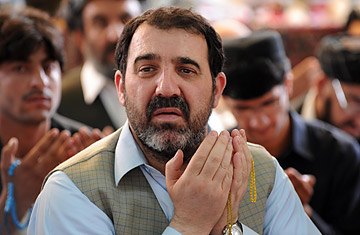
Ahmed Wali Karzai, brother of Afghan President Hamid Karzai, prays with the President's supporters at a gathering in Kandahar on Aug. 16, 2009
For the past eight years, the brother of Afghan President Hamid Karzai has reportedly been on the CIA payroll. The brother has also long been accused of being one of Afghanistan's biggest narcotics dealers (he has vehemently denied both claims). According to the New York Times, the brother, Ahmed Wali Karzai, is a CIA source, providing bases for the CIA as well as the U.S. military and serving as a go-between with parts of the Taliban. If it sounds a lot like Vietnam when Vietnam started to really come apart, it is — President Diem's grotesquely corrupt brother was a CIA source and a noxious agent of influence.
It would be fascinating to know what kind of intelligence Ahmed Wali Karzai is giving the CIA. If he's telling it that things are fine in Afghanistan, that more American soldiers, time and money will take care of the Taliban and that Hamid Karzai is a competent leader, well, then we have a real problem. One that's a lot bigger than drugs. And it's an even bigger problem if the White House believes anything Karzai has to say.
But before anyone calls for a congressional investigation, let's remind ourselves that Afghanistan isn't Sweden. We had no problem dealing with Afghan Islamic fundamentalists, terrorists, drug dealers and thugs when the Carter and Reagan White Houses waged a proxy war against the Soviet Union in the '80s. The CIA and the White House turned a blind eye to our proxies' faults because the fundamentalists were the best fighters and happy to take down our Cold War enemy.
We came into Afghanistan in October 2001 with the same willful blindness. The CIA knew that its ally the Tajik Northern Alliance was a paid-up proxy of Iran, just as it was fully aware that another ally, Uzbek General Dostum, was one of Afghanistan's great butchers (though Dostum has always denied the widespread allegations of his brutality). When it came to finding crucial partners on the ground, there were simply no alternatives.
And let's not forget that the CIA isn't the only organization with questionable people on its payroll. Since the beginning of the war, NATO has been bribing drug smugglers to let fuel pass through the Khyber Pass from Pakistan into Afghanistan. NATO payments, thousands of dollars for each truck, have to dwarf anything the CIA is giving to Ahmed Wali Karzai.
You can take it to the bank that the CIA knows all of this, just as it knew in the early '60s that Diem's brother was a corrupt thug. You can also be certain that the CIA would prefer to have untainted sources. But the bone-dry bed of reality in Afghanistan is that there are few if any to be had. In that country, you survive by renting clans, tribes and narcotics dealers, which comes with their unsavory business whether you like it or not.
And none of this is to mention that Afghanistan is a country swimming in the heroin trade. Illicit narcotics is conservatively put at $3 billion a year — about 15% of Afghanistan's GDP. Finding someone not one way or another involved in it is next to impossible.
The real question for the U.S. should not be about the morality of a drug dealer on the CIA's payroll but whether it's a metaphor for the huge challenge we face in Afghanistan. Do we stand any chance at all of building a modern, peaceful nation with confederates like Ahmed Wali Karzai? Vietnam would suggest the answer is no.
Baer, a former Middle East CIA field officer, is TIME.com's intelligence columnist and the author of See No Evil and, most recently, The Devil We Know: Dealing with the New Iranian Superpower.
